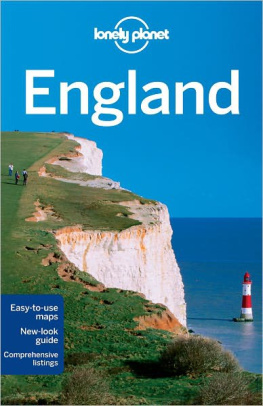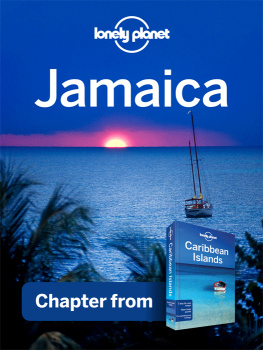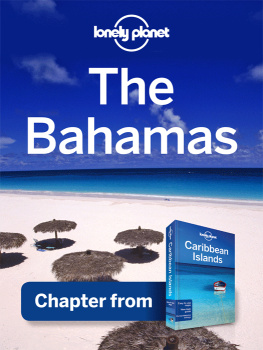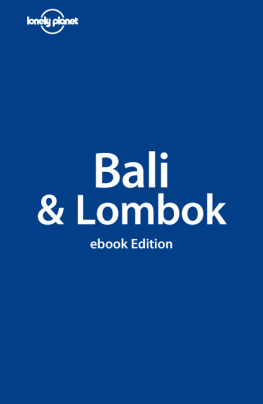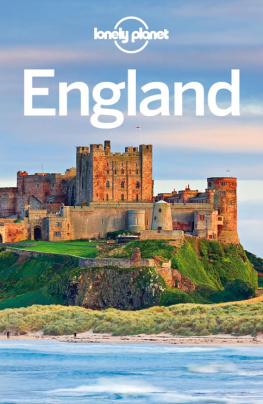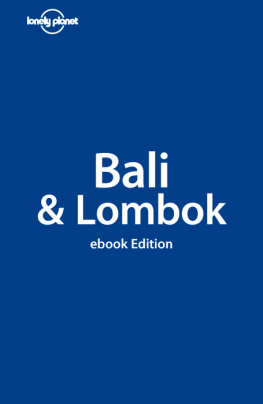Ver Berkmoes - England: Lonely planet guide
Here you can read online Ver Berkmoes - England: Lonely planet guide full text of the book (entire story) in english for free. Download pdf and epub, get meaning, cover and reviews about this ebook. City: England;Hawthorn;Vic, year: 2001;2003, publisher: Lonely Planet, genre: Non-fiction. Description of the work, (preface) as well as reviews are available. Best literature library LitArk.com created for fans of good reading and offers a wide selection of genres:
Romance novel
Science fiction
Adventure
Detective
Science
History
Home and family
Prose
Art
Politics
Computer
Non-fiction
Religion
Business
Children
Humor
Choose a favorite category and find really read worthwhile books. Enjoy immersion in the world of imagination, feel the emotions of the characters or learn something new for yourself, make an fascinating discovery.
- Book:England: Lonely planet guide
- Author:
- Publisher:Lonely Planet
- Genre:
- Year:2001;2003
- City:England;Hawthorn;Vic
- Rating:5 / 5
- Favourites:Add to favourites
- Your mark:
- 100
- 1
- 2
- 3
- 4
- 5
England: Lonely planet guide: summary, description and annotation
We offer to read an annotation, description, summary or preface (depends on what the author of the book "England: Lonely planet guide" wrote himself). If you haven't found the necessary information about the book — write in the comments, we will try to find it.
England: Lonely planet guide — read online for free the complete book (whole text) full work
Below is the text of the book, divided by pages. System saving the place of the last page read, allows you to conveniently read the book "England: Lonely planet guide" online for free, without having to search again every time where you left off. Put a bookmark, and you can go to the page where you finished reading at any time.
Font size:
Interval:
Bookmark:
Oxford, the
Cotswolds
& Around
The West Midlands
& the Marches
Cumbria & the
Lake District
Throughout its long history, its been a green and pleasant land, a sceptred isle and a nation of shopkeepers. Its stood as a beacon of democracy and a bastion of ideological freedom, as well as a crucible of empire and a cradle of class oppression. The Magna Carta, the King James Bible and the welfare state were all dreamt up here, but then again so were beer bellies, Bovril and Mr Bean. Its a nation of tea-tippling eccentrics and train spotters, of dog lovers and footy fanatics, of punk rockers, gardeners, gnome collectors, celebrity wannabees, superstar chefs, free-wheeling city traders, pigeon fanciers, cricket bores and part-time Morris Dancers. To some its Albion. To others its Blighty. To many its the most eccentric, extraordinary and downright incomprehensible place on earth. Welcome to England.
Few places can boast such a muddle of conflicting characters as this tiny country. Its a place where contradiction is soaked into the fabric of the landscape. For every green field and rolling dale, theres a flat fen or wind-battered stretch of coastline, and for every faded seaside resort, historic castle and thatch-topped village theres a gleaming new skyscraper, concrete office block or carbuncular car park to match.
Its a nation in thrall to its history but also addicted to a constant process of reinvention. Shiny new cappuccino bars, chain pubs and out-of-town shopping centres have plugged the gap left behind by closing post offices, country inns and village shops. Rural villages are filling up with second-homers and urban refugees, while the old smog-blackened cities of Englands northern heartland are finding new leases of life as centres of cultural adventure and artistic innovation. But while change is rampant in some corners, others remain stubbornly resistant to progress: despite huge investment, the trains havent improved that much, the National Health Service still doesnt work and England still cant string a few wins together at cricket (or football, or rugby, or tennis). Even the old NorthSouth divide is still alive and well: ask any northerner what they think about having to foot the multi-million-pound bill for London to host the 2012 Olympics, and chances are the answer wont be all that complimentary.
After a decade of unprecedented growth, soaring house prices and booming profits, underpinned by some dubious financial wheezes in the City, it looks like Englands financial bubble has finally popped. As we go to press in late 2008, the property market is in freefall, petrol prices had gone through the roof and unemployment, food prices and inflation are all on the rise. And no one neither the cabbies nor the newspaper commentators, and certainly not the mandarins and spin-doctors in Whitehall seems to have the foggiest idea where England is headed as the global downturn bites and the shadow of recession looms.
Population: 51 million
Size: 50,000 sq miles (130,000 sq km)
Inflation: 5.2%
Unemployment: 5.7%
Average number of cups of tea drunk per person per day: 3
Hours spent commuting per year: 139
Number of divorces granted per year: 132,500
Number of Jedis in official census: 390,000
Total number of televisions: 30,500,000
Average number of days when it rains: 1 in 3
But beyond the dreaded return to boom-and-bust economics, there are deeper schisms at work. In the wake of continuing devolution of power from the central government to regionally elected assemblies in Scotland, Wales and Northern Ireland, Englands own identity has become a subject of fierce debate. Theres even the possibility that the centuries-old Union could be at risk of breaking up with consequences not just for Englands bank balance, but also for the nations fundamental sense of self. This cuts to the heart of some profound questions about what the notion of Englishness means in a globalised, homogenised world, about the values, beliefs and institutions that bind the country together. Ever nervous about causing unnecessary conflict between the countrys increasingly polarised communities black and white, Muslim and Christian, North and South, town and country England finds itself stuck in a kind of ideological limbo, with people wary of taking a stance that might be misinterpreted or misrepresented by the headline-hungry jackals of the British media.
This national process of soul-searching chimes in with a growing sense of unease about where English society is headed. A recent spate of stabbings and shootings coupled with the growing gang culture in many English cities, plus the continuing divisiveness of the wars in the Middle East and the fallout from the 7/7 tube bombings (committed by British-born extremists) all hint at the disaffection and disillusionment felt by many English communities. Even the most unbiased observer would have to admit that theres something slightly awry in a country that has more CCTV and speed cameras than anywhere else in Europe and where the nations kids have been dubbed the unhappiest in the Western World according to a recent Unicef poll.
Its perhaps unsurprising that record numbers of people are giving Blighty the boot in favour of pastures new. But others are opting to stay in England and go back to the land, quitting the cities for slower, greener, more sustainable lives in the countryside. Transition towns, organic farms, yurt campsites, rooftop wind-generators and grow-your-own vegetable patches are all the rage in England. In a world staring down the barrel of irreversible climate change, Englands newfound eco-consciousness might have arrived in the nick of time.
So while there may be choppy waters ahead, if theres one thing this plucky little nation has proven down the centuries, its resilience (so long as theres a nice hot mug of tea to hand, of course). More than 2000 years of history are packed into this pocket-sized island, and no matter what the future may hold, the true jewels in Englands crown its country houses, castles and chocolate-box villages, its landmark monuments and buzzing music scene, its sweeping countryside, revitalised cities and extraordinary coastline remain as bright and untarnished as ever. The wars are still raging, the economys looking dicey and the weathers as reliably awful as ever, but one things for certain England hasnt had her day just yet.
If there were an international league table measuring sights per square acre, this proportionally challenged country would top the charts. Englands diminutive dimensions might be a recurrent headache for its residents, but theyre a boon for travellers: youre pretty much guaranteed to be no more than a days journey from the next must-see sight, historic monument or landmark town.
But despite its small size, England doesnt always do its best to make travelling easy (spend a few days negotiating the public transport network and youll see what we mean). So some pretrip planning is really worthwhile, allowing you to access cut-price hotel rates, cheap train fares and out-of-season deals that you wont find if you leave everything to the last minute. One things for sure theres an English adventure to suit all tastes and budgets, whether that means camping under country skies, bunking down in a boutique B&B or splashing out on a swish metropolitan pad.
When you travel will depend on the type of holiday youre looking for, but regardless of when you arrive, the good old British weather is bound to play a part in your plans. The English have long been preoccupied with the nations weather, and things look set to become even more unpredictable thanks to climate change (just look at the devastating summer floods of 2007 for a sign of things to come). But despite the unpredictability, there are a few rules that underpin the seasons. Winters tend to be cold and wet, with the hottest and driest weather generally reserved for July and August. The shoulder seasons often produce the best weather: sunny spells jostle for space with sudden showers between March and May, while balmy Indian summers often pitch up between September and October. Snow in England generally arrives either end of winter, especially in November and February.
Font size:
Interval:
Bookmark:
Similar books «England: Lonely planet guide»
Look at similar books to England: Lonely planet guide. We have selected literature similar in name and meaning in the hope of providing readers with more options to find new, interesting, not yet read works.
Discussion, reviews of the book England: Lonely planet guide and just readers' own opinions. Leave your comments, write what you think about the work, its meaning or the main characters. Specify what exactly you liked and what you didn't like, and why you think so.

